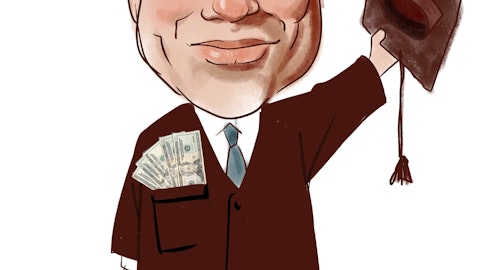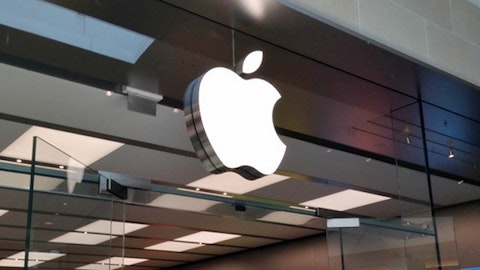As David Tepper‘s Appaloosa Management shed its stake in several U.S. securities during the fourth quarter, its holding in Apple Inc. (NASDAQ:AAPL), which had earlier comprised 1.72% of the fund’s portfolio value, went out the door also. Even though Apple shares appreciated by 13.17% during the first quarter which would have added weight to the fund’s quarterly performance, Appaloosa still managed to post decent gains of 4.7% based on the 27 long positions in companies with a market cap of more than $1 billion, according to our methodology. In comparison, Kevin Kotler’s Broadfin Capital was the best performer for the first quarter with returns of 60.3% for his 11 qualifying long positions, based on the same metric. The S&P 500 ETF (SPY) on the other hand returned just 0.9% during the first quarter.

Tepper founded Appaloosa Management in 1993 after leaving Goldman Sachs when his partnership was turned down for the third time. His knowledge of the market had little to do with the whole Goldman Sachs episode and his departure in all likelihood marked the flight of significant value from the investment bank. True investment geniuses prove their mettle when the markets are turbulent and Tepper did just that in 2009 in the midst of the financial crisis, when he bought stakes in the most scary sector at the time, finance. After the US Treasury Department published a white paper detailing how it aimed to pull the big banks out of the abyss that they had slipped into, Tepper was confident that the plan was going to work, even though his stake continued to slide. That move eventually paid off with significant gains. Hence his strategy to roll back his exposure in the US securities during the fourth quarter must have had a sound reasoning behind it. Although the fund did miss the 13.7% returns from Apple Inc. (NASDAQ:AAPL) over the first quarter, some investment decisions are made on a longer time horizon. The top three holdings that won Tepper’s trust as of the latest 13F filing were General Motors Company (NYSE:GM), HCA Holdings Inc (NYSE:HCA) and Priceline Group Inc (NASDAQ:PCLN), which represented over 30% of the fund’s portfolio value.
Insider Monkey tracks hedge funds’ moves in order to identify actionable patterns and profit from them. Our research has shown that hedge funds’ large-cap stock picks historically delivered a monthly alpha of 6 basis points, though these stocks underperformed the S&P 500 Total Return Index by an average of 7 basis points per month between 1999 and 2012. These stocks were able to generate alpha because of their lower risk profile. On the other hand, the 15 most popular small-cap stocks among hedge funds outperformed the S&P 500 Index by an average of 95 basis points per month. These stocks were slightly riskier, so their monthly alpha was 80 basis points (read the details here). We believe investors will be better off by focusing on small-cap stocks rather than large-cap stocks. However, risk-averse investors may also have a slight edge by focusing on hedge funds’ large-cap picks rather than investing in index funds.
General Motors Company (NYSE:GM)‘s 8.29% first quarter returns were the highest gains among the fund’s top 3 picks during the fourth quarter. Appaloosa’s most valuable holding consisted of 14.68 million shares valued at $512.44 million. Other investors who held significant stakes in the automotive company were Warren Buffet of Berkshire Hathaway and Frank Brosens of Taconic Capital. While General Motors Company (NYSE:GM) continues to face costly adversity from its recalls due to faulty ignition switches, new concerns about the company’s performance are also popping up. The low price of fuel has meant that customers are fleeing to other gas guzzler options from rival companies. Although the shift in consumer patterns has increased GM’s March sales from the truck category by 14% compared to the same quarter last year, total sales slid by 2% year-over-year.





